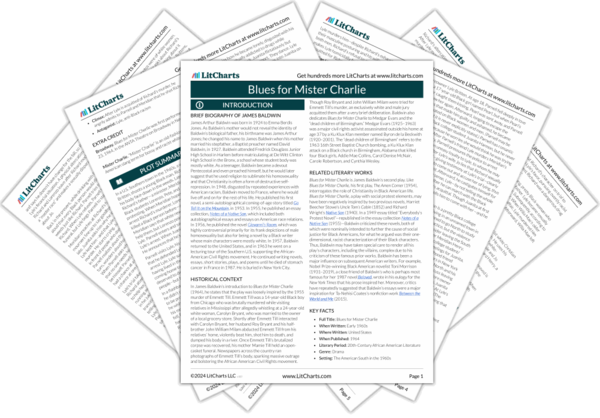In Blues for Mister Charlie, guns represent how in a white-supremacist society, Black people are denied the right to legitimate self-defense. Early in the play, Lorenzo, a Black student who has been protesting for civil rights, points out that white counter-protestors have been trying to kill the Black protestors, the white police won’t protect Black people—and the Black protestors have “no guns.” In a flashback occurring later in the play, a young Black man, Richard Henry, tells his grandmother Mother Henry that he has a gun and means to use it if attacked—horrifying her, implicitly because she believes white people would kill him if they found out he possessed a weapon. Later, to soothe his grandmother, Richard gives the gun to his father, the Christian minister Meridian Henry, for safekeeping. After Richard—while unarmed—is shot to death by a virulently racist white store owner named Lyle Britten, Meridian wonders aloud to his white friend Parnell James whether he did the right thing in asking Black protestors not to secure weapons and to protest only nonviolently. When Parnell argues that Black people would “be slaughtered” if they took up arms, Meridian observes that Black people are being “slaughtered anyway.” Thus, guns represent a catch-22 for Black Americans in a white-supremacist society: they will be killed for securing guns with the intention of defending themselves against racist violence—but they will also be killed if they are unarmed.
This catch-22 becomes even clearer during Lyle’s trial for Richard’s murder. Though Lyle shot Richard to death, the defense lawyer (called only The State) spends a great deal of time trying to establish whether Richard had a gun, erroneously implying that Richard’s having a gun would justify Lyle’s murder of him. Thus, in the play, guns represent how only white people are allowed to defend themselves with violence; Black people are treated as suspicious and killed if they defend themselves—but they’re also killed if they don’t defend themselves.
Guns Quotes in Blues for Mister Charlie
Juanita: And then you wouldn’t be any better than they are.
Lorenzo: I don’t want to be better than they are, why should I be better than they are? And better at what? Better at being a doormat, better at being a corpse?
Lorenzo: They been asking me about photographs they say he was carrying and they been asking me about a gun I never saw. No. It wasn’t like that. He was a beautiful cat, and they killed him.












